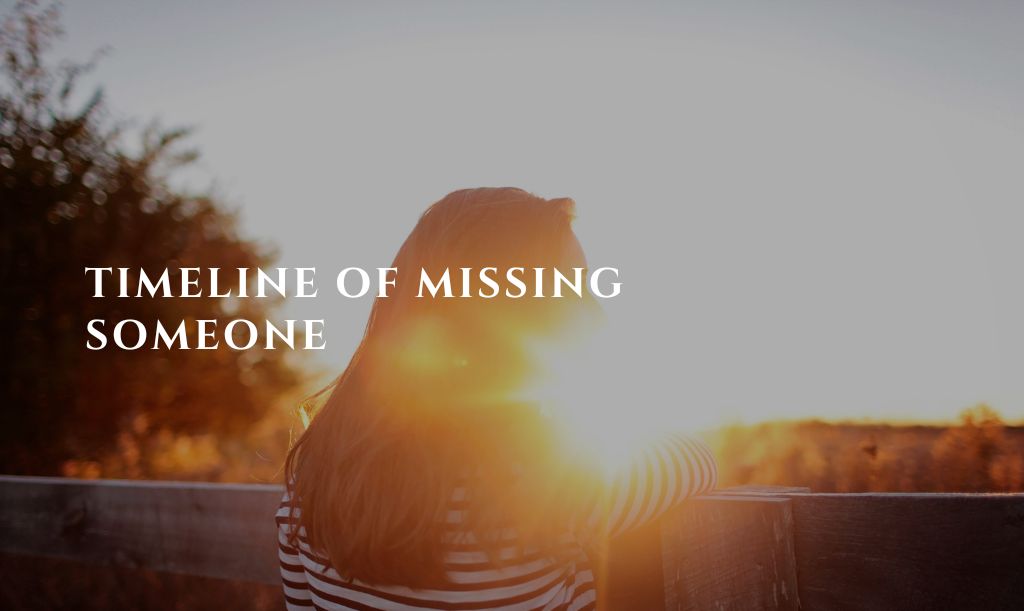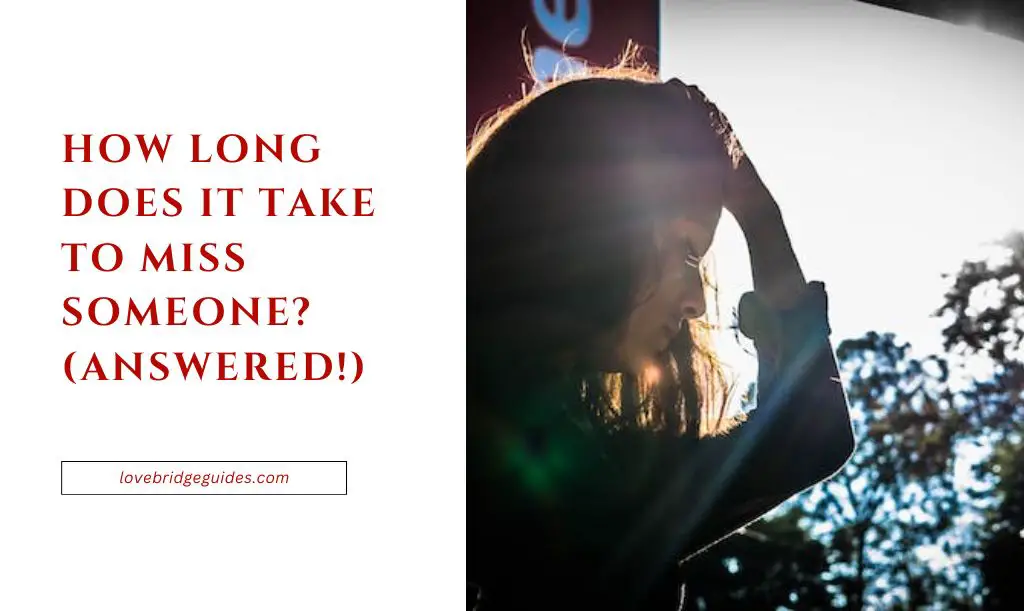Quick question: How long does it take to miss someone?
To miss someone is not merely a passive longing for their physical presence; it encompasses a profound yearning for their essence, their energy, and their unique place in our lives.
It involves an acute awareness of their absence and an intense desire to bridge the distance between ourselves and that cherished individual.
The experience can be likened to waves crashing against the shore, relentlessly pulling us back into memories and emotions tied to that person.
It stirs up nostalgia like an old photo album filled with sepia-toned snapshots of laughter, shared experiences, and heartfelt conversations.
But make no mistake; missing someone is not always pleasant or romantic.
It can be gut-wrenching and agonizing as we grapple with feelings of loneliness, longing, and even frustration at our inability to be in proximity to them once more.
These emotions intertwine like tangled vines within our souls, creating a stormy sea that threatens to engulf us in sorrow.
In some instances, missing someone may inspire personal growth as we learn to navigate life’s challenges without them by our side.
On other occasions, it may lead to a sense of stagnation, as we find ourselves trapped in a constant state of yearning, unable to move forward.
The emotional impact is undeniable, and it varies from person to person and relationship to relationship.
Factors Influencing How Long It Takes to Miss Someone

When it comes to missing someone, the depth of the connection we have with them plays a significant role in determining how long it takes for that void to set in.
Let’s be honest here, there’s a world of difference between missing a close family member and missing some acquaintance you barely know.
The bonds we form with our family members are often rooted in shared experiences, unconditional love, and years spent building memories together.
On the other hand, acquaintances come and go like fleeting shadows in our lives.
So don’t expect me to shed any tears over some random person I barely interacted with.
The depth of connection matters.
Romantic Partners vs Friends
Now, my astute readers might argue that romantic partners hold more significance than mere friends when it comes to missing someone.
And they would be absolutely correct!
Romantic relationships are often imbued with passion, intimacy, and a deep emotional investment that surpasses what we experience in friendships.
When we are separated from our romantic partners, the intensity of our longing can reach agonizing levels as we yearn for their presence and affection.
Duration of Separation
How long will this separation last?
Will it be just a temporary absence or an indefinite stretch into infinity?
These questions weigh heavily on how quickly we feel the pangs of longing for someone who is no longer by our side.
Short-term separations may cause momentary sadness or nostalgia but rarely leave us yearning for more than just an occasional phone call or visit.
However, when faced with long-term absences – months or even years without that person’s physical presence – the ache in our hearts intensifies.
Time becomes our enemy, and each passing day feels like an eternity.
Frequency of Contact during Separation
Now, let’s talk about the frequency of contact during separation.
I’m here to break it to you: if you’re constantly in touch with someone while they are away, the chances of missing them diminish significantly.
Technology has bestowed upon us a plethora of methods to communicate instantaneously across vast distances.
But indulging in constant contact undermines the very essence of missing someone.
How can you truly long for someone when they are just a text or video call away?
It is in those moments when communication is scarce, and anticipation builds with every missed interaction that we truly yearn for their presence.
The Timeline of Missing Someone: From Initial Separation to Longing

Stage 1: The Honeymoon Phase
The sweet and bittersweet period of the honeymoon phase when you first start missing someone.
It’s like being caught in a whirlwind of nostalgic reminders and fond memories.
Every song, every familiar scent, every insignificant object suddenly becomes imbued with meaning.
You can’t help but drift down memory lane, reliving those cherished moments that made your heart flutter and your soul sing.
And as you traverse this treacherous terrain of longing, loneliness inevitably sets in.
The initial separation leaves you feeling adrift in a vast ocean of emptiness.
Loneliness seeps into the very fibers of your being, reminding you that something vital is missing from your life.
Your world feels incomplete without their presence, and an indescribable ache begins to gnaw at your core.
Stage 2: The Void Deepens
But hold on tight because things are about to get even more tumultuous during stage two: the void deepens.
As time passes, the intensity of your emotions surges like a tidal wave crashing against the shores of your soul.
Longing takes center stage and consumes your thoughts day in and day out.
It’s utterly exhausting how even the most mundane daily habits or routines trigger memories that bring tears to your eyes.
A simple cup of coffee reminds you of shared mornings spent laughing over spilled milk.
A particular street corner evokes memories of aimless walks hand-in-hand, exploring each other’s worlds while getting lost in conversation.
The void deepens further as you navigate through this emotional labyrinth where even the smallest reminders seem to stab at your heart.
You yearn for their presence so fiercely it becomes tangible—a physical ache that permeates every fiber of who you are.
Stage 3: Adaptation and Acceptance
But fret not, for there is light amidst the darkness.
Stage three brings with it the emergence of coping mechanisms and the gradual embrace of acceptance.
It is in this phase that you begin to adjust to life without their constant presence, albeit with occasional pangs of longing.
Coping mechanisms start to emerge as you find ways to fill the void left by their absence.
You may immerse yourself in hobbies or dive headfirst into your career, seeking solace and distraction from the ache within.
Slowly but surely, you learn to navigate life on your own terms, discovering newfound strength and resilience within yourself.
Moreover, this stage becomes an opportune time for personal growth and independence.
With each passing day, you realize that missing someone does not define who you are; it is merely a testament to the depth of connection forged between two beings.
As you embrace your individuality and nurture your own desires and aspirations, missing someone transforms into a bittersweet reminder of shared experiences rather than an overwhelming void that consumes your every waking moment.
The Influence of Context on Missing Someone

When it comes to missing someone, our surroundings play a substantial role in resurrecting the dormant emotions buried deep within our hearts.
The mere sight of a familiar place or the echo of a specific sound can transport us back to moments shared with that special someone.
It’s remarkable how the mind works, effortlessly pairing sights, sounds, and smells with memories and emotions.
Whether it’s the whiff of freshly brewed coffee that reminds you of cozy mornings spent together or the sound of waves crashing against the shore that transports you back to seaside escapes, environmental triggers have an uncanny ability to evoke vivid recollections and intensify pangs of missing someone.
Places that Hold Sentimental Value
There are certain places that hold sentimental value in our hearts—places where we created cherished memories with those we long for.
These locations become sacred ground, imbued with remnants of laughter, love, and shared experiences.
It could be a park where you once strolled hand in hand or a quaint café where you indulged in heartfelt conversations over steaming cups of tea.
These places act as time capsules for our most treasured moments together, amplifying our sense of longing when we find ourselves standing on their hallowed grounds alone.
Social Media and Technological Advances
Social media is the double-edged sword of modern times.
While it has undoubtedly revolutionized communication and bridged gaps between individuals across great distances, it also has its drawbacks when it comes to missing someone.
In this era inundated with virtual connections and digital interactions, social media can both alleviate and exacerbate the pain of separation.
On one hand, it provides us glimpses into their lives through photos and updates—a temporary respite from yearning.
Yet on the other hand, scrolling through social media feeds can also intensify the frequency and intensity of missing someone.
Each post, each picture becomes a bittersweet reminder of what we’re missing out on, fueling our desire to be reunited.
Virtual Connections as a Temporary Relief
In an increasingly interconnected world, virtual connections offer a temporary reprieve from the ache of missing someone.
Video calls and messaging apps allow us to bridge the physical distance and momentarily feel closer to those we yearn for.
However, it is important to recognize that these virtual interactions are merely substitutes for genuine human connection.
While they may provide fleeting comfort, they cannot fully satiate our longing for physical presence, touch, and shared experiences.
Virtual connections act as mere placeholders until we can once again embrace our loved ones in person.
The influence of context on missing someone cannot be overlooked.
Environmental triggers have the power to transport us through time and awaken dormant emotions associated with those we miss.
Places that hold sentimental value become sacred reminders of cherished moments shared together.
Social media and technological advances act as both solace and torment in our quest to cope with separation.
And while virtual connections offer temporary relief, we must remember that they can never replace the genuine human connection we deeply crave.
The Role of Personality in the Experience of Missing Someone

Attachment styles shape our experiences of missing someone!
Anxious attachment style individuals tend to cling tightly to others, fearing abandonment and constantly seeking reassurance.
They live in a perpetual state of longing, their hearts forever reaching out for that familiar presence.
On the other end of the spectrum, we have those avoidant attachment style folks who regard emotional intimacy with skepticism and self-reliance as their holy grail.
They have mastered the art of detachment, minimizing their need for connections and thus reducing their susceptibility to prolonged pining.
How Attachment Style Influences Duration
It’s quite evident that our attachment styles play a crucial role in determining just how long we miss someone.
Those with an anxious attachment style may find themselves trapped in a never-ending cycle of yearning and longing due to their inherent fear of abandonment.
Even after reuniting with their loved ones, they may continue to miss them intensely simply because they cannot bear the thought of losing them again.
In stark contrast, individuals with an avoidant attachment style might experience shorter bouts of missing because they are more adept at distancing themselves emotionally from others.
Their ability to detach allows them to adapt quickly to separations and move on without dwelling on past connections.
How Long Does It Take To Miss Someone: Conclusion
So, how long does it take to miss someone?
Well, the experience of missing someone is highly subjective and influenced by various factors such as depth of connection, duration of separation, environmental triggers, and even one’s own attachment style.
While it is natural for us humans to yearn for our loved ones when they are absent from our lives (especially if we possess an anxious attachment style), it is important not to let this longing consume us entirely.
Embracing the temporary nature of separations and focusing on personal growth and independence can help alleviate the intensity of missing someone.
Remember, absence makes the heart grow fonder, but it also presents an opportunity for personal development and strengthening of one’s own identity.
Related Articles:
- https://lovebridgeguides.com/my-boyfriends-brother-is-ruining-our-relationship/
- https://lovebridgeguides.com/showing-up-at-ex-house-unannounced/
- Does A Prom Date Mean Anything? (Answered!) - 20 February 2024
- Boyfriend Refers To Me In Third Person (Explained!) - 20 February 2024
- Is Sending Memes Flirting? Find Out Here! - 20 February 2024

